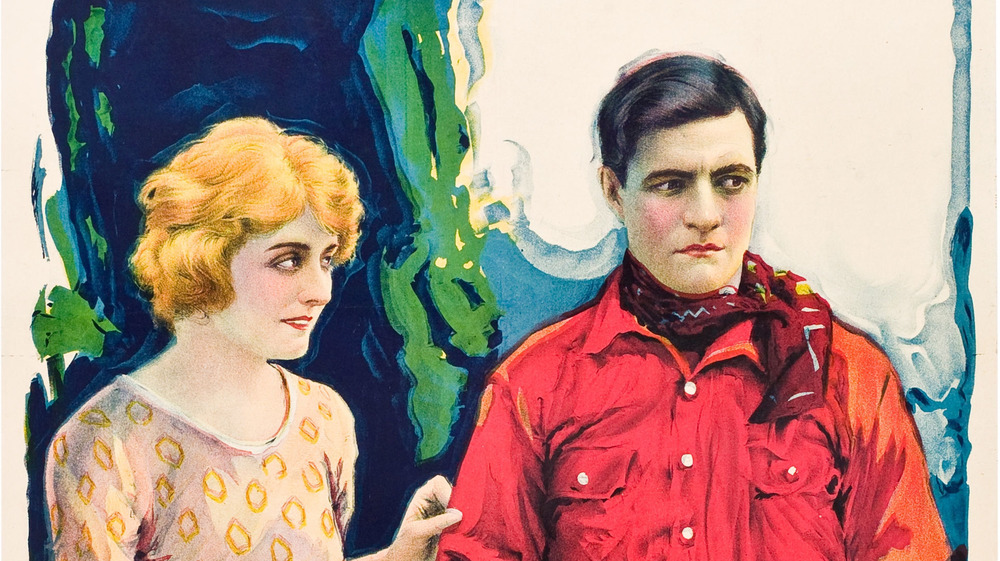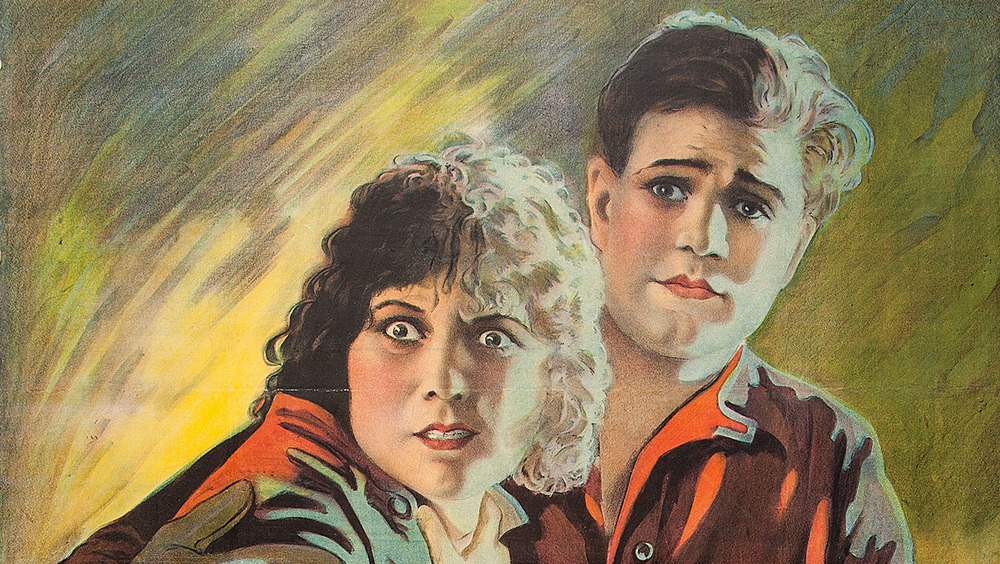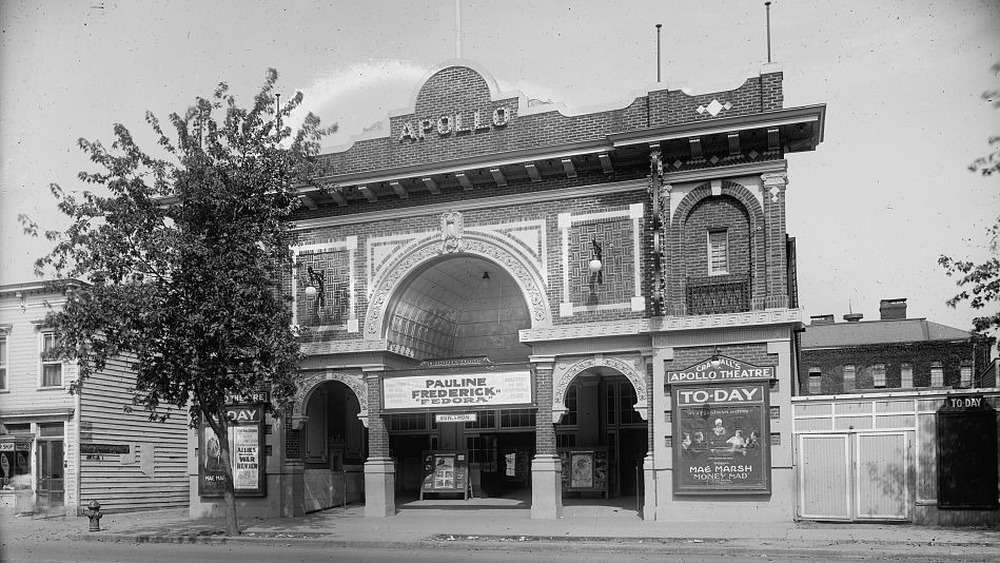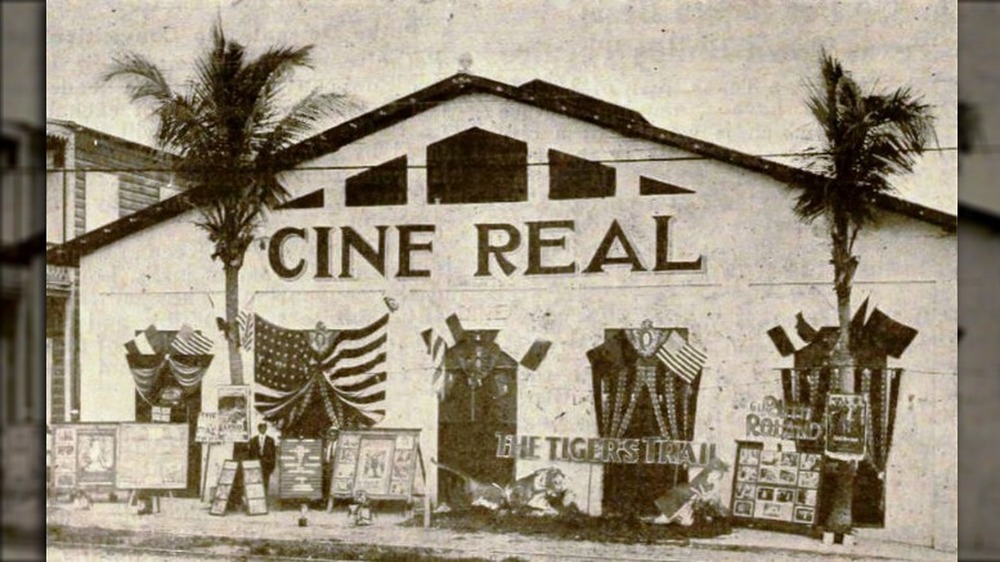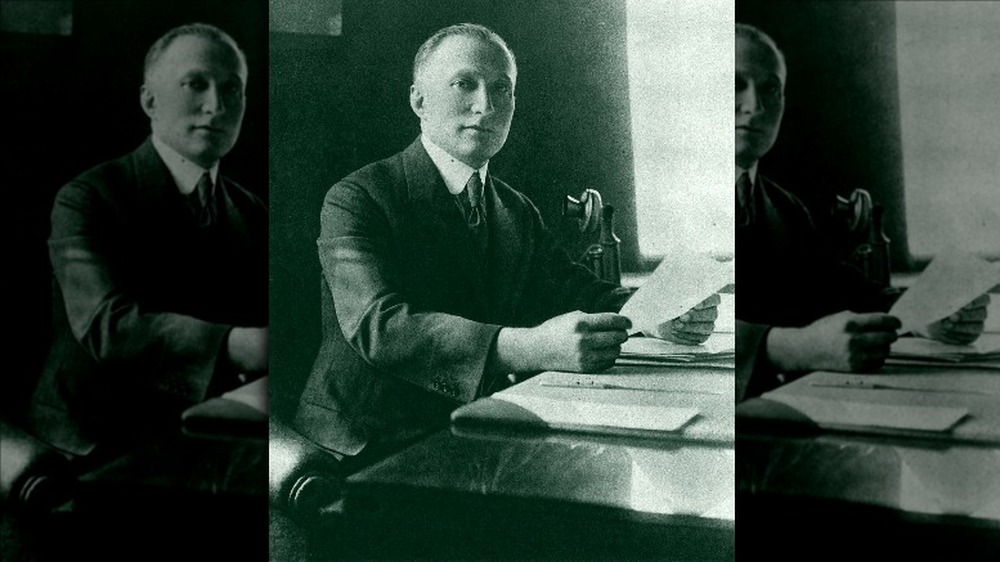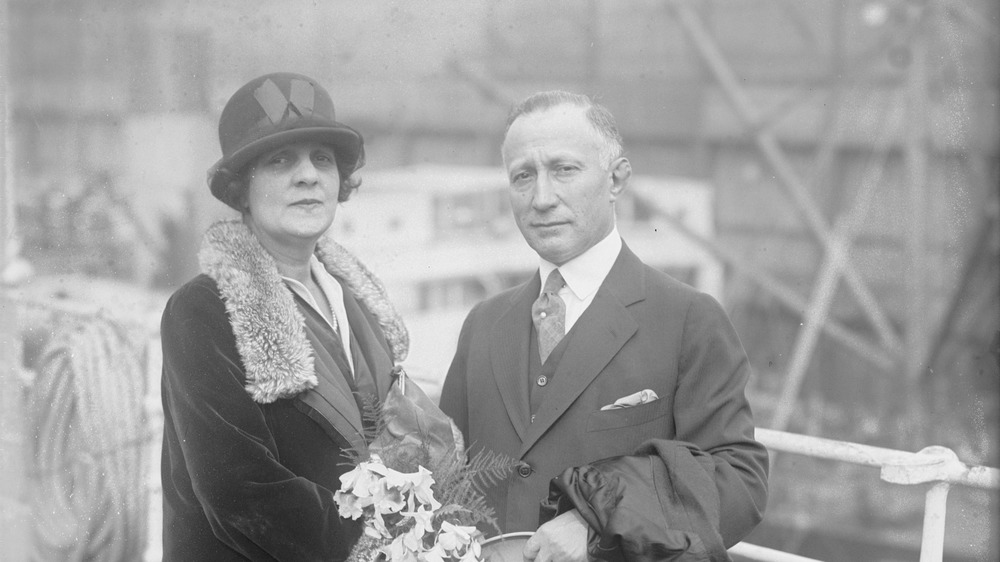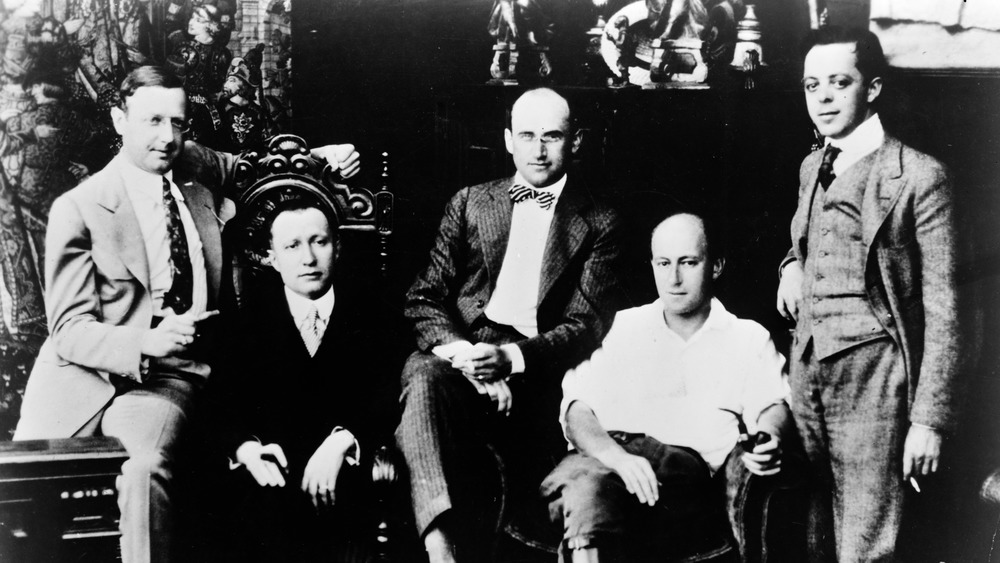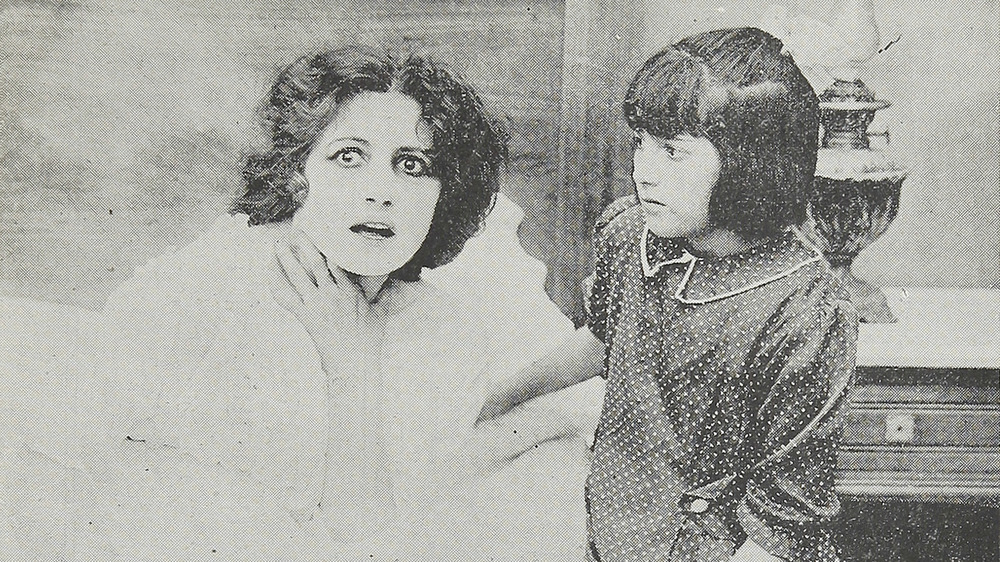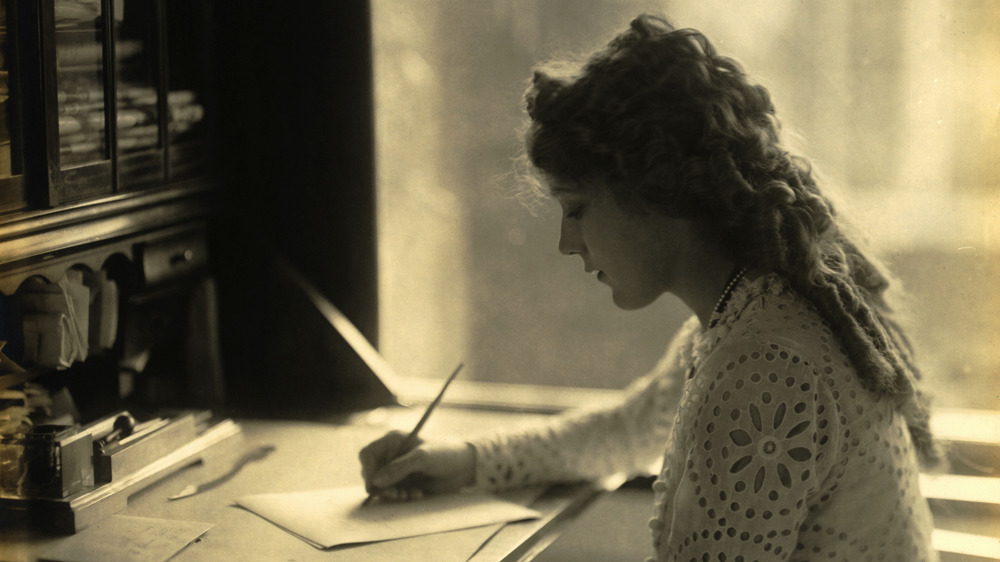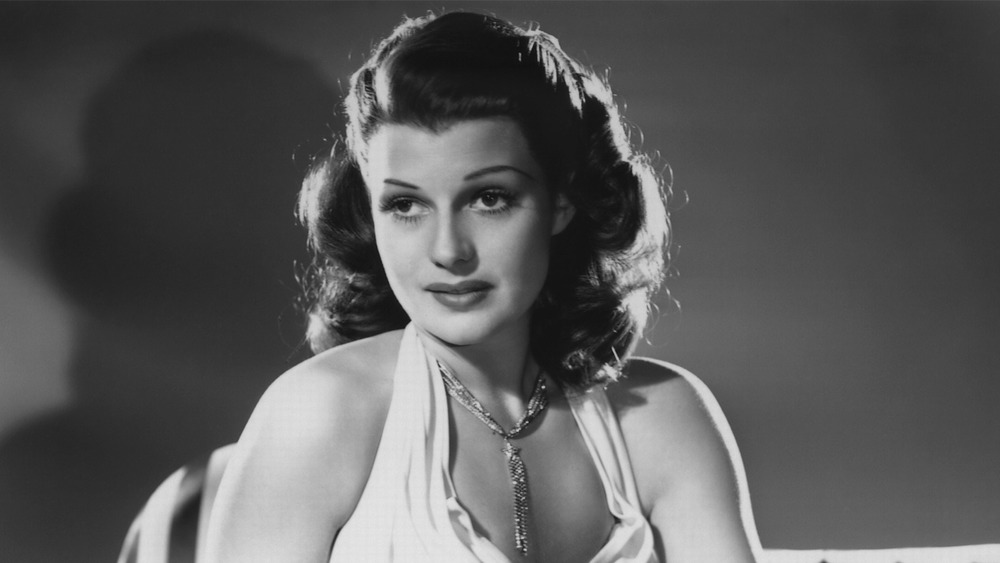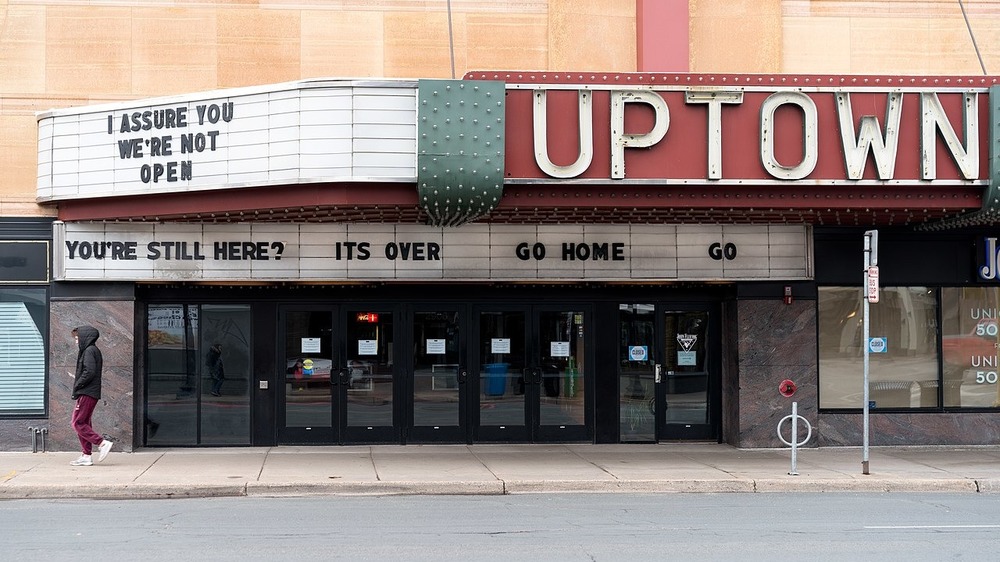How One Man Used The Spanish Flu Pandemic To Change The Movie Industry
The film biz is pretty tough, with long hours, demanding coworkers, and constant worries about money, creativity, and acclaim on everyone's mind while they try to make a movie. That's enough on its own, but what if you add in a pandemic? That can throw it all into chaos, taking a project from routine worries about budgets and schedules to existential concerns about the future of film. Studios might shut down, filming becomes difficult, actors get sick, and suddenly very few people feel safe piling into a movie theater together.
However, 2020 isn't the first time that the film industry has had to deal with a pandemic caused by a contagious respiratory virus. In 1918, it also faced the threat of the Spanish flu, an extra-infectious and sometimes deadly strain of influenza that affected nearly everyone around the world. According to the CDC, about one-third of people worldwide were infected by the strain. Even healthy people could succumb to the disease, with an estimated 50 million people dead from the disease by the time it more or less faded away in 1919.
Like the covid-19 pandemic, the 1918 flu completely upended the movie industry. Yet, while many theaters were closing and studios were struggling to make films, one producer saw an opportunity. He decided to take advantage of the moment, not coincidentally lining his pockets in the process, and proceeded to completely change the movie industry. We're still feeling the effects of his morally dubious actions over a century later.
The 1918 influenza pandemic devastated the film industry
The 1918 flu pandemic dealt a devastating blow to people worldwide. According to History, as the virus infected an estimated 500 million people over 1918 and 1919, alarm began to set in. To combat the strain of this deadly respiratory virus, people everywhere were encouraged to wear masks over their noses and mouths, while businesses and public gathering places were routinely closed. In many places, ordinances and fines were enacted to enforce public health measures.
Per The Hollywood Reporter, studio heads and theater owners on the west coast of the United States tried, for a time, to pretend that the pandemic wouldn't reach them. Yet, it arrived all the same. The flu began wreaking havoc on theater attendance and made film production very difficult. Then, in October 1918, the National Association of the Motion Picture Industry enacted a month-long embargo on new films. That same month, L.A. closed all "places of amusement" until further notice, which included 83 already-struggling movie theaters.
Meanwhile, studios began to either shut down production or modify it to such an extent that people began to fret about the future of the still-young movie industry. According to Deadline, production appears to have more or less stopped from October until November 1918, at least for most California-based studios. Even when these relatively small, independent studios resumed work, they suffered a severe financial hit, with Paramount losing the equivalent of $30 million of today's money over the course of a year.
Before the pandemic, most movie theaters were independent businesses
Before the 1918 pandemic, the Hollywood film industry was dramatically different than it was today, especially when you compare the audience experiences between then and now. Back then, movie theaters could take on any number of forms, as The Hoya reports. An early 20th century moviegoer might see the latest film in an independent mom-and-pop kind of place, perhaps run out of a small store front. Or, they might go into a large and grand movie palace. Heck, they might even go into a tiny nickelodeon theater with a scattering of chairs and someone providing accompaniment to the short silent film on a piano. While the settings may have varied, however, the business operation was often similar. Most movie theaters from this period were independently run.
A number of theaters were also owned and operated by women and people of color, who were also often involved in independent studios as well, Deadline reports. They were also frequently involved in the distribution of films, too, making early Hollywood a far sight more diverse than it would become mere decades later.
It wasn't long to last, however. The pressures of the influenza pandemic, combined with rising operating costs and the frankly scheming efforts of a producer named Adolph Zukor, dealt punishing blows to the independent operators. With dwindling attendance, municipal orders demanding that they close, and the fear of the influenza pandemic, many independent theaters soon began to struggle mightily beginning around 1918.
Movie theaters were hit especially hard by the Spanish flu pandemic
While Hollywood studios and distributors could find ways to get around restrictions by reducing the number of people on set, movie theaters had a more difficult road ahead. Because influenza is a respiratory disease and because movie theaters are necessarily enclosed spaces where people might be obliged to sit closely together, they were targeted in numerous orders nationwide.
According to Film School Rejects, some places allowed a few theaters to remain open. To survive, some other theaters tried to enforce health measures, which mask wearing and, in at least one case, publicly shaming coughers and sneezers via slides that would be inserted into the projector mid-movie.
Per the Historical Journal of Film, Radio and Television, others argued that movie theaters could be a useful way to communicate information about the pandemic in an age where computers and smartphones were little more than wild dreams. Yet, as Time reports, these arguments meant little when a large organization like the National Association of the Motion Picture Industry simply stopped sending new films to movie theaters. Though that particular embargo only lasted about a month in late 1918, it was apparently enough to send some in the burgeoning film industry into a panic. A few experimented with outdoor projections, while others called for mask-wearing ordinances, cleaning crews armed with disinfectant, and some simply returned because they missed going to see a movie and forgetting the world outside for an hour or so.
Adolph Zukor was a film producer who saw opportunity in the midst of disease
In the midst of all this confusion and upset, one man in the Hollywood scene saw an opportunity. Or, rather, he saw an opportunity to implement a plan that he'd already begun cooking up long before the Spanish flu had come along and created an opening. Whether or not his actions would be considered morally ambiguous seems not to have mattered to one Adolph Zukor.
According to Deadline, Zukor was a film producer who had already established himself in the growing American movie industry. The patchwork landscape of independent studios, distributors, and movie theaters apparently bothered him. From an organizational and financial perspective, there were some significant flaws. Moreover, there was an opportunity here to establish a sort of monopoly that would give Zukor and his associates more power and money than others must have dreamed of before.
Zukor's idea was, simply enough, to take control of everything. From the studios that made films, to the networks that got them out to theaters, to the theaters themselves — why not manage each aspect of the process? All it would take was a good reserve of money and some on-the-ground work that, not coincidentally, took advantage of struggling business owners in the midst of a worldwide influenza outbreak.
Zukor came from an obscure background
As PBS reports, Adolph Zukor was born in 1873 Hungary, a time and place that seemed poorly set up to produce a notorious Hollywood film producer. But young Adolph soon proved that he wasn't interested in going along with the plan that had been set for him. He was originally meant to be a rabbi like his uncle, Kalman Liebermann, who had taken in his nephew when the boy was orphaned at only age seven. After much effort, Adolph eventually made it clear to Uncle Kalman that he simply wasn't cut out to be a rabbi.
The 16-year-old Adolph moved to New York, where he worked a series of jobs that eventually led to him becoming a penny arcade owner. The arcade had early forms of short movies called "nickelodeons”. Those films needed to be shown somewhere, which meant that Zukor and his business partner started making "exhibition halls" that acted as early movie theaters. Ultimately, this led him to the world of theater and film via his own company, The Famous Players Film Company and, more concretely, to California.
Whatever you may conclude about his ethics, it's clear that Zukor was a shrewd and persistent businessman. Certainly, that's what other people thought of him as his star rose and rose. By 1935, he was the chairman of Paramount Studios and would win an Academy Award in 1948.
The film industry takeover helmed by Zukor could get ugly
So, the enterprising and clearly energetic Zukor had a plan. According to Deadline, the basic outlines of the said plan involved buying up as many theaters as possible. Zukor and his associates may have thought this would be easy, given that so many of the movie theater operators were hanging on by a thread, if they hadn't closed already. Who wouldn't be tempted to just sell the whole operation, even if Zukor was offering what could be considered an insultingly low price?
Some owners resisted that temptation. However, that didn't mean Zukor calmly walked away. Struggling movie theater proprietors might then see a newer theater being built directly across the street from them. He wasn't above other tactics either, though, given that they were apparently carried out by lawyers and other colleagues, Zukor could at least have plausible deniability.
As the journal Film History reports, some allege that Zukor also stooped to intimidating film exhibitors with threats and perhaps even a bit of violence here and there, too. Confronted with such a show of force from an already powerful Hollywood producer and combined with the grinding economic pressures of the pandemic, it's no wonder that Zukor's scheme was ultimately successful.
Zukor's acquisitions paved the way for the Hollywood studio system
Adolph Zukor may have seemed to be acting on a plan that took advantage of the financial instability kicked off by the Spanish flu, but it was much bigger than the short-term gains he and his colleagues soon enjoyed. As it turned out, Zukor was setting up for one of the biggest changes to come to Hollywood and the film industry in the coming decades.
As Deadline reports, Zukor's method of snapping up struggling theaters and taking control of the film distribution system paved the way for the rise of the studio system. Handy for him, given that Zukor turned his Famous Player company into Paramount and became, essentially, the head of Hollywood for years.
The studio system helped shore up the film industry, as Britannica reports. It also pushed for widespread technological advances, like the rise of the sound-filled "talkies" after rivals like Warner Brothers started sending out records to play with their films. It also created a monopoly that used self-imposed censorship and reigned over creatives with an iron fist. The ultra-restrictive "Production Code" was adopted by the system in 1934 after protests over violence and sexuality in films started to threaten profits. It represented a new and highly codified creative change, as, for example, scriptwriters were forced to write love stories that inevitably lead to marriage and gangster movies that always ended with a moralistic punishment for the baddies.
One of Zukor's closest Hollywood associates caught the flu
Though Adolph Zukor may have greeted some aspects of the pandemic with glee, in other ways, the deadly influenza pandemic came back to haunt him. While there isn't any evidence that Zukor himself got sick with the 1918 Spanish flu, people close to him certainly did. He may have been especially worried when Mary Pickford became ill with the disease. According to PBS, Pickford was a rising star who agreed to enter into a contract with Zukor. As it turned out, Pickford was pretty great at negotiating her fee over the years, eventually making pretty considerable amounts of money for the time. "Mary was a terrified businessman," Zukor would later say. Coming from him, that would high praise indeed.
That didn't help her much, however, when she caught the influenza virus. According to Deadline, Pickford became ill in the first months of 1919. So, too, did other stars of the day like Lillian Gish. Though both Pickford and Gish eventually recovered, some actors and other Hollywood professionals succumbed to the disease. In late 1918, up-and-coming actor Harold Lockwood died from pneumonia caused by the Spanish flu, as Silents Are Golden reports. While Pickford went on to become a megastar, Lockwood's name faded into obscurity in part because of his early death.
Some would later allege that Zukor's studio system was abusive
Though Zukor wasn't directly responsible for the entire Hollywood studio system, he had a hand in establishing the ruthless practices that would make this a notorious time in film history. For, as studios gained a monopoly over the movie industry, the studio system then became rife with abuse for the actors and other creative people who were caught up in the web.
That's because, with control over how films were made and distributed, down to the very theaters where they were shown, actors became little more than hostages of the system. For instance, as The Guardian reports, a young Judy Garland was effectively forced to take amphetamines by studio executives to keep her energy up for grueling film shoots. And some actresses were forced into abusive, exploitative situations or else faced career-damaging consequences, as when Joan Collins declined to be "nice" to an executive and so lost out on a starring role as Cleopatra.
If an actor didn't play along in one way or another, they might be forced to leave the business altogether. And those who stayed still suffered the consequences. Rita Hayworth, who was pressured to drop her original "ethnic" name of Margarita Canseco and who also had to undergo painful electrolysis to raise her hairline, according to The Hairpin, had a tragic story that was undoubtedly influenced by her abusive time in the studio system and at the hands of its executives.
Though Hollywood has changed, covid-19 has brought back some familiar issues
Modern readers will undoubtedly have already drawn parallels between the influenza-wracked film world of 1918 and the 2020 movie industry hit by the covid-19 pandemic. How much has really changed and what has stayed the same?
Technically speaking, the Hollywood studio system ended in 1948, according to Turner Classic Movies. That's when Paramount was hit with an antitrust case, United States v. Paramount. The studio was forced to divest many of its holdings, including theaters. As a result, actors today are somewhat more independent, though don't tell that to anyone who signed a multi-film deal with massively lucrative film companies like Marvel (via Harvard Business Review). Indeed, actors are still often subject to intense pressures from studios and the film industry in general.
Likewise, the covid-19 pandemic has shown numerous weak points in the industry, from studio production to theater showings. Once again, commentators like those at The Conversation are wondering if the world of film is on "life support" because of a novel respiratory virus that has forced people to stay away from crowded indoor spaces. Even mask wearing has become an object of contention, with not all celebrities buying into the public health measure, according to USA Today. Perhaps the old adage is really true, after all: the more things change, the more they stay the same. Maybe, if he were here now, Zukor would be cooking up yet another idea to line his pockets.
